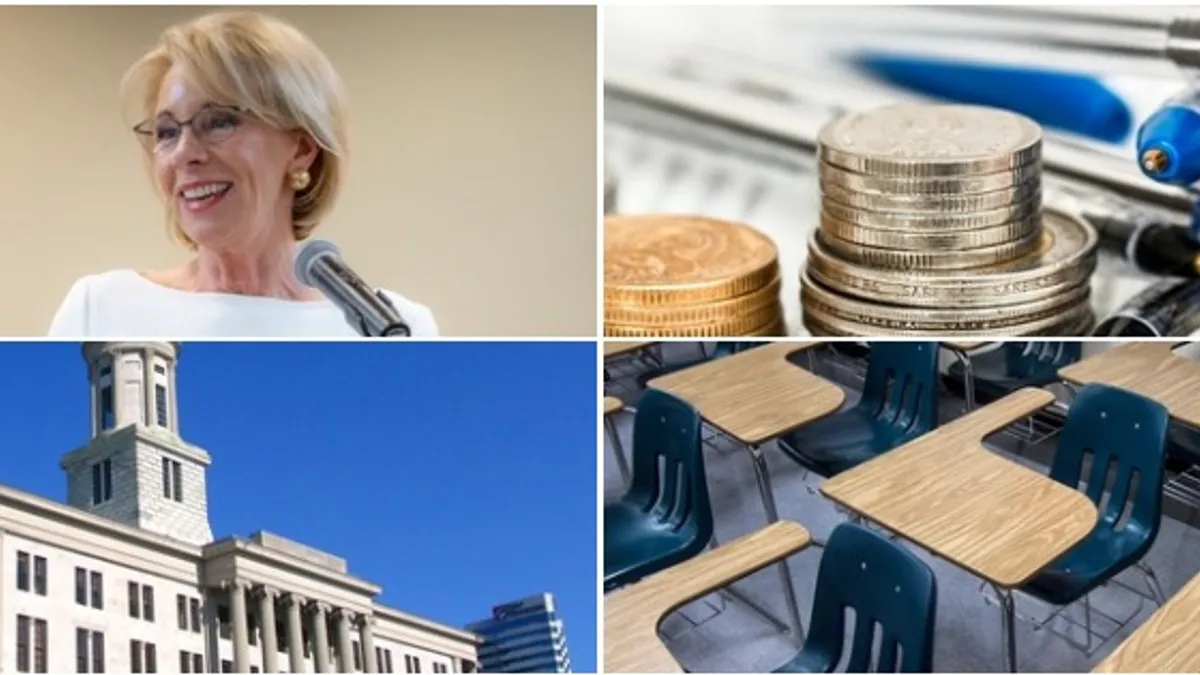This latest column focuses on some of the key takeaways from what's happened in state policy during the past month. Previous installments of The 50 States of Education Policy, along with an interactive map that breaks down policies in each state, can be found here.
While school choice and school choice-friendly policies aren't new, there's been a lot of talk around these topics in April. In the month after President Donald Trump's Fiscal Year 2020 budget request was introduced, U.S. Secretary of Education Betsy DeVos began visiting states to campaign for one of the administration's main education proposals: Education Freedom Scholarships (EFS). And as states continue making their way through their 2019 legislative sessions, lawmakers in several regions are clashing over measures that promote school choice.
Below is a recap of the major state-related school choice policy news that took place this month:
DeVos touts Education Freedom Scholarships
This school choice-promoting proposal — under which taxpayers can choose to contribute in exchange for dollar-for-dollar federal tax credits capped at $5 billion annually — was first announced in February. The idea behind these scholarships is that the credits would be for private donations to scholarship-granting organizations, and states could use the funds for initiatives including dual enrollment, private schools and homeschooling.
DeVos and congressional Republicans — most notably, Texas Sen. Ted Cruz, who has introduced companion legislation in the Senate — have continued to advocate for this proposal, even in the face of resistance from Democratic lawmakers and public school proponents who say EFS would siphon money away from the traditional public school system.
In early April, DeVos and Cruz appeared at the 2019 Reagan Institute Summit on Education and continued to promote what they deem a "critical" initiative, which won't pass through Congress unless it gains bipartisan support. This month, DeVos also visited Nashville, where she praised Tennessee Gov. Bill Lee for his state's progress toward school choice through proposed voucher legislation. DeVos also visited Kentucky in April to discuss school choice and the tax credit program.
Ultimately, backers of this federal proposal want to hand control to the states, as well as to expand their educational options through the tax credit-based scholarships. While the federal budget proposal doesn't fall under state education policy, it's also worth noting that the administration made big asks when it came to school choice. Aside from the EFS program, it wanted $500 million for the federal Charter School Program, a doubling of the D.C. Opportunity Scholarship program, and more Title I funding for states to use in supporting public school choice efforts.
States weighing voucher, other choice-friendly bills
With many states months into their 2019 legislative sessions, some have taken up the issue of school choice in one form or another. This month, some of those bills made notable progress. For one, both the Tennessee House of Representatives and the state Senate passed the governor's controversial education savings account bill, which would create a voucher-style program that would give parents public school money to use on private schools or other educational services. It hasn't yet become law, but Lee called the moment "historic."
Florida also made strides in school choice when state Senate Republicans, on April 25, passed an omnibus education package that would create a Family Empowerment Scholarship that would help give parents more options by paying for them to enroll their children in private or charter schools.
In Oklahoma, supporters of the Oklahoma Equal Opportunity Education Scholarship Act, which is in the House, are urging for it to be passed. The bill would provide tax credits to those that donate to organizations that give out private school scholarships. The bill would also raise the tax credit cap and split the credits evenly between public school grants and scholarships. But the students who benefit from the program have to meet certain requirements, including having a learning disability or living in a school district that the state said needs improvement.
In Arkansas, however, a statewide school voucher bill, which was approved in the Senate, died in the hands of the House Education Committee.
The implications
The EFS proposal has stirred controversy since it went public in February. The biggest concern from skeptics and opponents is that the program will take money away from public schools. DeVos has denied this claim, saying these scholarships are privately funded, but some analyses beg to differ. The Washington Post, for instance, asserts multiple claims: First, while federal taxpayers aren't funding the scholarships, they have to make up the revenue — which could have funded public education — that's lost as a result of the new tax credits.
In addition, the Post notes, the EFS program did not appear as an expenditure in the U.S. Department of Education's budget request — it shows up in the Department of the Treasury's. So, in order to prevent adding to the federal deficit, "DeVos and the Trump administration are choosing to fund the tax credits while choosing to cut the department’s programs," the Post reports.
Ultimately, the EFS plan faces an uphill battle in getting passed, and DeVos and Cruz have admitted that the measure needs bipartisan support if it has any chance of taking effect. And while the school choice movement has plenty of support, it also has fierce opponents.
Aside from the EFS proposal, Trump's fiscal 2020 budget request also has implications on states when it comes to school choice. Its moves to grow school choice-related funding, while also cutting dozens of other federal programs — including Arts in Education, Full-Service Community Schools and the Teacher Quality Partnership — could influence state policymaking, because it means states will have less assistance on several arguably important education initiatives.
When it comes to state policy, passage of state school choice bills could be significant in the context of the school choice movement. For example, six states currently have education savings account programs, and five are active, according to EdChoice. If Tennessee's bill becomes law, it could be a "real step forward" for school choice and its beneficiaries, Jonathan Butcher, a senior policy analyst at The Heritage Foundation, told Politico. And with several states still in the midst of their legislative sessions, there's still time for some additional school choice bills to get the support they need for passage.





















